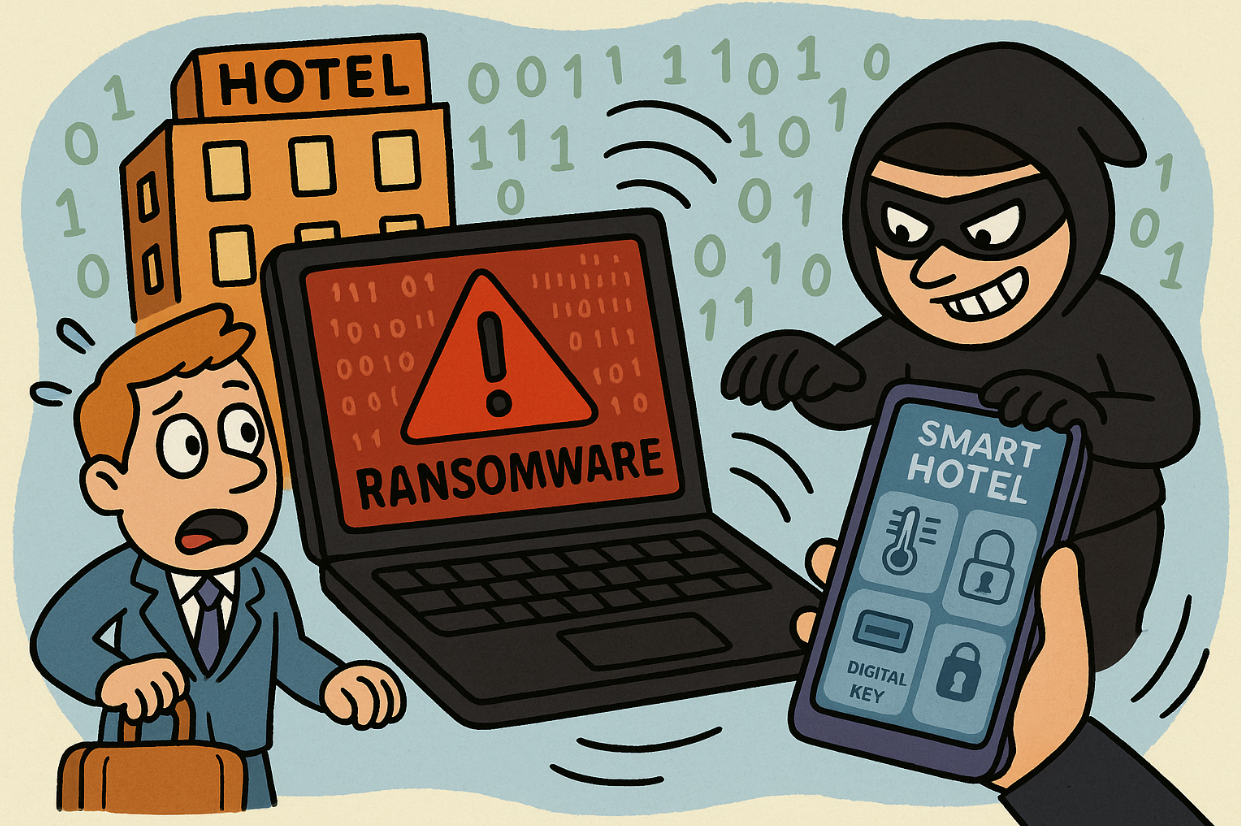Canadian Hotel Chain Faces Widespread Outages After Lapses in Cyber Governance Disrupt Booking and Payment Systems
The Challenge
MapleStay Hospitality Group, a national hotel and resort operator, suffered a severe operational disruption when a ransomware attack crippled its booking, payment, and guest management systems. Years of informal IT governance and outdated software maintenance practices left critical infrastructure vulnerable.
The incident began when an unpatched point-of-sale (POS) terminal at one of its flagship hotels was compromised, allowing attackers to move laterally through the corporate network. Within hours, booking systems across 14 properties went offline, forcing cancellations, refund delays, and manual check-ins. The company estimated direct losses exceeding $3 million, with reputational damage and regulatory scrutiny further compounding the crisis.
Investigations revealed that MapleStay lacked a centralized cyber governance framework. Responsibilities for security oversight, compliance reporting, and vendor management were scattered across departments. Documentation for monitoring, patch management, and incident response was inconsistent or incomplete, leaving the organization unable to demonstrate due diligence under the Personal Information Protection and Electronic Documents Act (PIPEDA). Insurers withheld claims pending evidence of governance controls, and major travel partners suspended integrations due to uncertainty over data security.
The event underscored a critical weakness in the hospitality industry: without robust governance structures, complex ecosystems of vendors, reservation systems, and customer data can rapidly become high-risk exposure points.
Our Solution
Our Risk and Compliance Governance team was engaged to design and implement a Cyber Governance and Compliance Framework customized for multi-property hospitality operations.
The engagement began with a governance maturity assessment, mapping control weaknesses, oversight gaps, and compliance obligations across IT, operations, and customer service environments.
Key measures included:
- Development of a Cyber Governance Charter approved by executive leadership to establish clear accountability and oversight.
– Formation of a Cyber Risk and Compliance Committee linking IT, operations, and data privacy management.
– Implementation of standardized cybersecurity policies governing data protection, access control, vendor management, and incident response.
– Deployment of a centralized risk register and compliance documentation hub for audit and insurance validation.
– Delivery of executive and management training sessions on governance, PIPEDA obligations, and operational resilience.All governance elements were aligned with PIPEDA, ISO/IEC 27001, and the NIST Cybersecurity Framework, ensuring accountability from the boardroom to front-line operations.
The Value
Within six months of implementation, MapleStay achieved measurable improvements in compliance assurance and operational stability:
– Cyber insurance reinstated and premiums reduced following verified governance implementation.
– 60% reduction in system downtime risk through improved patch management and network segmentation.
– Restored confidence among travel platforms and corporate clients through transparent governance reporting.
– Improved regulatory posture with complete PIPEDA documentation and evidence-based incident response plans.
– Strengthened internal culture of accountability and cross-department collaboration in cyber risk oversight.
By embedding governance discipline into hospitality operations, MapleStay transformed compliance from a reactive necessity into a competitive advantage that reassured guests, partners, and regulators alike.
Implementation Roadmap
1. Assessment (Weeks 1–3): Conduct governance and compliance review; document existing risks and oversight structures.
2. Framework Design (Weeks 4–6): Draft governance charter, define oversight roles, and formalize policy documentation.
3. Deployment (Weeks 7–12): Implement governance tools, risk registers, and reporting dashboards.
4. Training (Weeks 13–16): Deliver executive, IT, and operations training on governance roles and compliance standards.
5. Continuous Monitoring (Ongoing): Maintain quarterly reviews, perform compliance audits, and refresh policies annually.
Info Sheet
Necessary Action Type and Steps to Be Taken:
– Immediate containment: Isolate compromised POS and booking systems; restore from verified backups.
– Governance structure: Establish board-approved cyber governance framework defining oversight, escalation, and accountability.
– Policy modernization: Update cybersecurity, privacy, and vendor management policies.
– Risk register: Implement centralized risk documentation for ongoing review and audit readiness.
– Compliance alignment: Ensure PIPEDA, PCI-DSS, and ISO/IEC 27001 conformity.
– Awareness and training: Deliver governance and privacy training to executives and property-level management.


